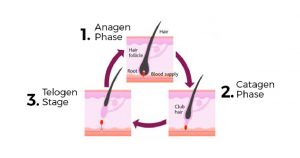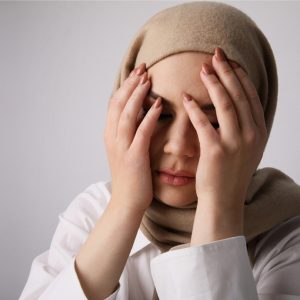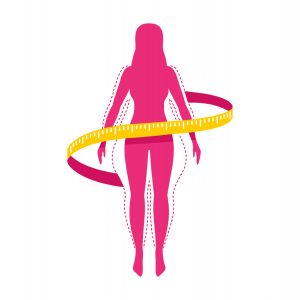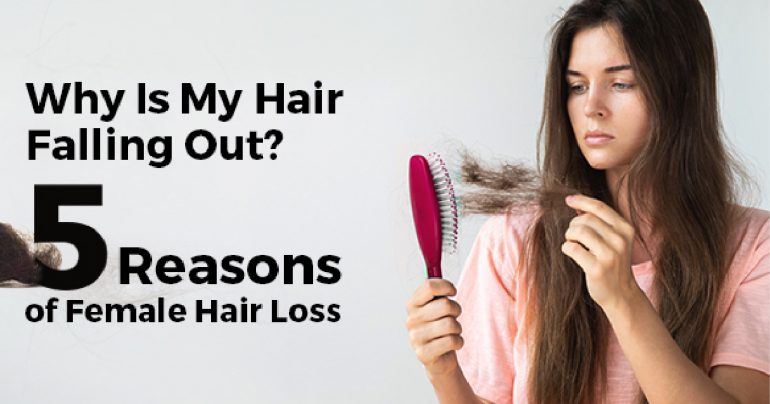If you find hair on your brush or in your sink, don’t panic. It is completely normal to lose some. On average, 25 and 40 hairs fall daily. This can climb up to a hundred in the spring and fall. Indeed, at these two times of the year, your hair loses many elements for 4 to 6 weeks. However, we can easily support this loss: we have between 100,000 to 150,000 hairs on our skull.
The Hair Growth Cycle: 3 Key Stages Explained

Like many things, hair is not eternal. It follows a life cycle consisting of 3 distinct periods.
1. Anagen Phase
First, there is the anagen phase, that is, the period of growth. The follicle grows from 0.7 to 2 cm per month, depending on the sex and the nature of the hair. This stage lasts between 2 and 7 years.
2. Catagen Phase
Then comes the catagen phase, a period of cellular rest where the growth is stopped. It lasts about three weeks.
3. Telogen Stage
The hair then enters its last period of life, called the telogen stage. It leads to its fall after a latency period of approximately three months. Most often, a new follicle will grow in the spot left free. So, hair loss is an integral part of its development. Several elements can favor it.
5 Potential Factors Causing Your Hair Loss
We know that foods rich in vitamins of groups B and E help prevent hair loss. We do not know which ones tend to cause it. Don’t worry. This article can help you know about the six foods that can cause your hair to fall.
40% of women suffer from hair loss, so here are 9 reasons:
1. Hormones

These are the main culprits in hair loss. Androgens, like testosterone, accelerate their life cycle and, therefore, their loss. A drop in melatonin, a hormone produced at night, can slow down growth. Pregnancy, a real hormonal cocktail, can also damage the hair. Postmenopausal women who face significant hormonal changes are also more likely to lose their hair.
2. Medical Reasons

There may also be medical reasons such as bad cholesterol or taking certain medications (chemotherapy, antiepileptics, antidepressants, immunosuppressants, hypertension, beta-blockers, non-steroidal anti-inflammatory drugs, anticoagulants, antibiotics: in particular those against tuberculosis).
3. Stress

Our hair is also very sensitive to extreme fatigue and stress. Very stressful periods, as well as emotional shocks, can cause temporary hair loss.
4. Drastic weight Loss

In addition, diet also influences the vitality of our hair and scalp. For example, people who go on drastic diets can see their hair fall out in significant numbers due to deficiencies. To have a beautiful mane, it is recommended to fill it up with vitamins of group B, Zinc, magnesium.
5. Foods
Certain foods can also promote hair loss:
a. Alcohol Consumption

Beyond its harmful effects on the liver, alcohol causes vitamin B deficiencies which play an essential role in hair renewal. The hair then tends to get greasy from the root.
It is also on the occasion of alcoholic hepatitis, which is more frequent than one would think since they are linked to occasional excesses of alcohol, that one can observe a fattening of the liver and ‘significant hair loss.
b. Fatty Foods and Pastries
Like alcohol, foods containing saturated fatty acids or trans-fatty acids, such as cold cuts, fried foods, and other pastries, tend to cause hair to fall out.
And for a good reason, they promote seborrhea of the hair by causing overconsumption of group B vitamins, necessary for the metabolism of lipids.
c. Drinks Rich in Tannins
Tannins contained in, tea, coffee, and wine can disrupt the intestinal absorption of iron.
However, an iron deficiency can explain hair loss, especially in a woman whose periods are abundant. This is why it is advisable to drink these drinks away from iron-rich foods to prevent their absorption.
Conversely, adding garlic and onion to food promotes the absorption of the iron contained, particularly legumes (peas, chickpeas, beans, lentils).
d. Dairy Products
As paradoxical as it may seem, excess dairy products are likely to lead to hair loss.
In question is an imbalance between calcium and magnesium.
Calcium is indeed an antagonism of magnesium. However, magnesium prevents hair loss by preventing calcium deposits in the hair follicles,” explains the dermatologist.
e. Foods Polluted by Plant Protection Agents
If we know the deleterious action of atmospheric pollutants on the hair itself, we know less about the harmful action of these same pollutants when they are absorbed in food.
Whether insecticides, fungicides, or herbicides, they tend to concentrate in our bodies. And in the long run, they disrupt the functioning of our various organs, including the scalp.
Because among the pollutants, there are many endocrine disruptors. And we know, for example, that anything that will disrupt the thyroid can cause hair loss.







